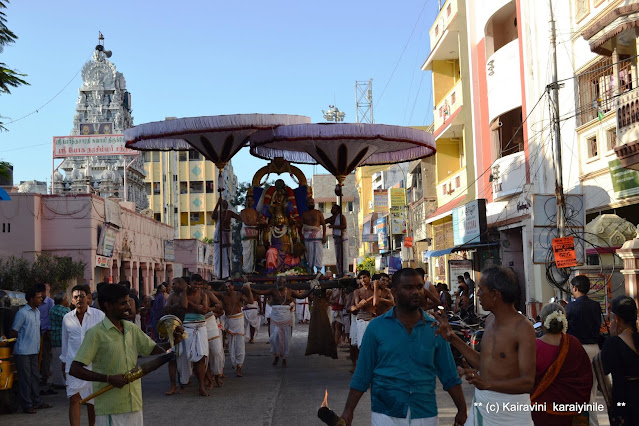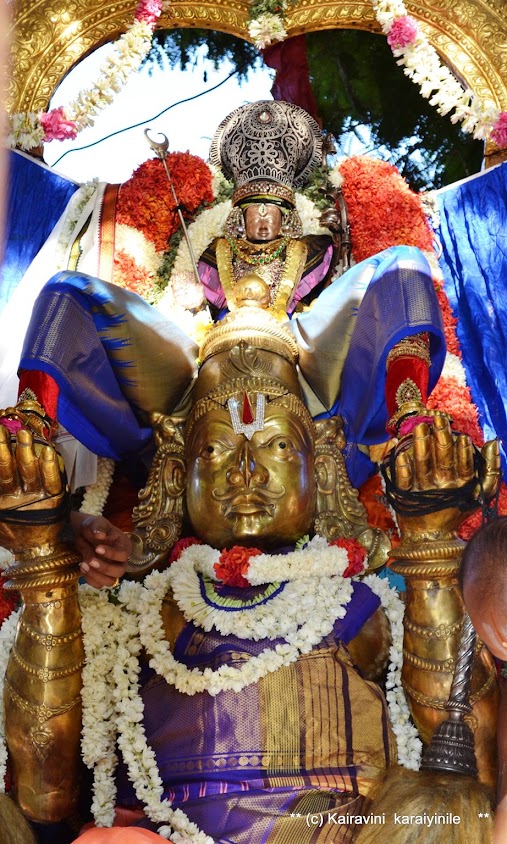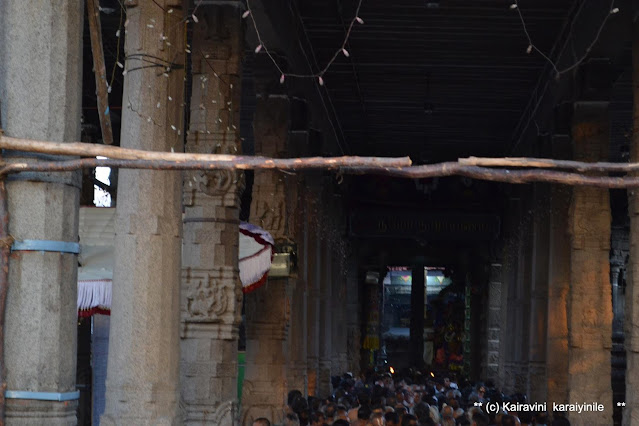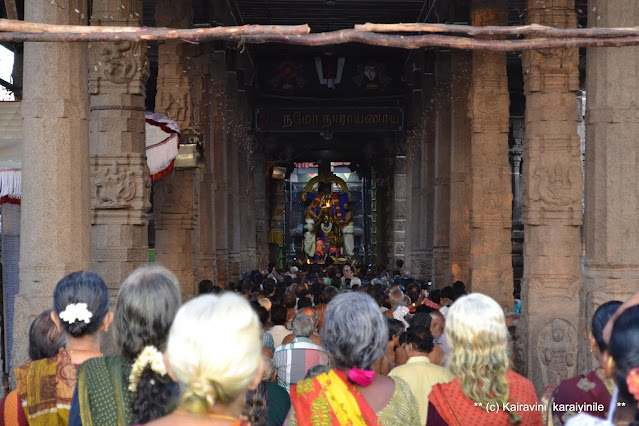எம்பெருமானின் அவதாரங்களிலே இராம அவதாரமும் கிருஷ்ணாவதாரமும் மிக்க சிறப்புற்றவை. சக்ரவர்த்தி திருமகனான ஸ்ரீராமபிரான், சகல சிறப்புகளும் மிக்கவன். மிகுந்த உயரிய குணாதிசயங்கள் கொண்டவன்.
Sri Rama was the embodiment of Dharma; He was a great personality endowed with great valour coupled with all virtues. He was the King of all Worlds yet chose to go to the forest forsaking all pleasures obediently following the words of His father to Kaikeyi.
The great epic ‘Sri Ramayana’ is not just a story which happened long ago; it has a philosophical, spiritual significance and a deep truth in it. The words ‘rays’ and ‘radiance’ come from the Sanskrit root word ‘ra’. ‘Ra’ means light, ‘Ma’ means within me, in my heart. The mighty warrior yet the most benevolent Rama was born in Ayodhya. When there is no conflict in our mind, then the radiance can dawn.
Rāmāyaṇa is the epic of the richest and longest surviving civilization on the face of the planet. The essence of Rāmāyaṇa boils down to Plurality and Righteousness. Rāmāyaṇa presents various challenging situations and shows how personalities succeed or fail in those situations. In Bala Kaanda Sarga 1 – Sage Nārada describes Rāma - the characteristics that are held in high esteem by the society of the times. (https://readramayana.org/)
इक्ष्वाकुवंशप्रभवो*
रामो नाम जनैः श्रुतः ।
नियतात्मा महावीर्यो* द्युतिमान्धृतिमान् वशी ॥
He is born into the lineage of Ikshwāku; He is known to all by the name Rāma. He has complete mastery over himself; He is a man of great valour; He is of brilliant radiance. He is extremely courageous. He has complete mastery over his senses.
Praying Lord Sree Rama will rid us of all sins and ensure that we live a life worthy of existence, calm, peaceful and helping humanity .. .. Carnatic music richly extols Sree Rama and here is one popular kriti, which for sure, many of you know more details.
Mysore Vasudevacharya (1865 – 1961) was a great composer of Carnatic music compositions who belonged to the direct line of Thyagaraja's disciples. Vasudevachar's compositions (numbering over 200) were mostly in Telugu and Sanskrit. Some of his most popular kritis include Broche varevaru ra in Khamas raga, Devadideva in Sunadavinodini, Mamavatu Sri Saraswati in Hindolam, Shankari Ninne in Pantuvarali, Bhajare Re Manasa in Abheri and Ra Ra Rajeevalochana Rama in Mohanam. He was a recipient of the civilian honour of the Padma Bhushan.
He is credited with two writings in Kannada, one of them an autobiography called Nenapugalu (memories) and Na Kanda Kalavidaru (the musicians I have met) in which he wrote the biographies of many well known musicians. Mysore Vasudevachar also taught in Rukmini Devi's Kalakshetra, (founded in 1936). He became the chief musician in Kalakshetra and helped in setting the Ramayana to music. He died in 1961 at the age of 96. He lived a simple and austere life devoted to the study of Sanskrit and music. He published a large number of his compositions in the book Vasudeva Kirtana Manjari. His compositions in Telugu have such sweetness and lilt, and beautifully blend with the tune of the raga as do the Sanskrit compositions, which are mellifluous. His songs reflect his mastery of Sanskrit and show his erudition and scholarship in Sanskrit literature. He considered his insight into Telugu as a gift from Thyagaraja (Thyagaraja's bhiksha). True to his Vaishnava heritage and the Thyagaraja shishya parampara to which he belonged, most of his compositions are in praise of Lord Rama. In addition to Kritis and Keertanas, he also composed Varnams, Thillanas, Javalis and slokas.. .. ..
This film in 1980 was a real classic and changed the way some of the movies had been taken – unlikely that a similar movie would ever be attempted – certainly not in Tamil tinseldom. It was reported that the producers after hearing the plot thought of Akkineni Nageswara Rao (some news that the director wanted Sivaji Ganesan) to perform the lead role. Eventually it was a debutant who was chosen by K Viswanath who scripted and directed the film, while Jandhyala gave the dialogues. There were 16 songs of KV Mahadevan that lifted the movie to great heights, making it a real musical extravavganza.
Sankara Sastri, a very popular Carnatic singer, is a widower with a daughter named Sarada. People come in huge numbers to listen to his voice and consider him to be a great man. He has mastered the raga Shankarabharanam and hence is eponymous with the same. Tulasi is a bonded woman's daughter who has a great interest in music and dance. She is also an admirer of Sastri, and goes to the riverbank in the early mornings when Sastri teaches music to his own daughter. One morning Tulasi is so thrilled by Sastri's singing that she begins dancing on the riverbank, oblivious of her surroundings. Sastri sees her, and Tulasi also comes to her senses and abruptly stops. She expects Sastri to rebuke her. But he appreciates her sincerity and continues singing.
Sankarabharanam (transl. The jewel of Sankara) directed by K. Viswanath, produced by Edida Nageswara Rao under the production company Poornodaya Movie Creations, starred J. V. Somayajulu, Manju Bhargavi, Chandramohan, and Rajyalakshmi. The soundtrack was composed by K. V. Mahadevan and remained a chartbuster. The film threw light on the chasm between Classical and Western Music based on the perspective of people from two different generations.
One of the hit songs in the movie was : “Broche varevaru ra” a popular Telugu composition of Mysore Vasudevachar in Raga Kamas.
బ్రోచేవారెవరురా నిను వినా రఘువరా నను
నీ చరణాంబుజములఁ నే విడజాల కరునాలవాల
brōcēvārevarurā
ninnu vinā raghuvara nanu1
nī caraṇāmbujamula(n) nē viḍajāla karuṇālavāla
Who else, but you,
is my saviour, O Lord Rama
I cannot let go of your lotus-feet, O repository of compassion!
Here
is the song from the movie Sankarabaranam sung by SP Balasubramanian and S
Janaki to the music of KV Mahadevan. :
The hero of the movie - Jonnalagadda Venkata Somayajulu (1920 – 2004) shot to fame with the movie and went on to act in a few Tamil, Malayalam, Kannada and Hindi films. In 1980, he received the Filmfare Award for Best Actor – Telugu for his work in the classic Sankarabharanam. On the centenary of Indian cinema, Forbes included his performance in the film among the 25 Greatest Acting Performances of Indian Cinema. Some of the other films that earned Somayajulu a good reputation as an actor were Allari Pillalu, Nelavanka, Rowdy Alludu, Swathi Muthyam, Tyagayya, Saptapadi, Vijeta, Appula Appa Rao, Vamsa Vruksham and the Hindi film Jaag Utha Insan. He portrayed the guru character of Sri Raghavendra in the Tamil film Sri Raghavendrar. He made a 13-episode television serial based on the play Kanyasulkam. He also portrayed A.C. Bhaktivedanta Swami Prabhupada, in the biographical series Abhay Charan.
Somayajulu was born in Srikakulam, was a Govt official and worked as a Deputy collector for Mahabub Nagar district. His career spanned five decades in stage dramas, films and television.
Reminiscing the glorious past and praying Sree Ramachandra murthi – here are some photos of Sree Ramar Garuda sevai at Thiruvallikkeni divyadesam on 9.4.2016.
Mamandur Veeravalli Srinivasan Sampathkumar
30.1.2022











Very nice👌👌👌🌹🌹🌹
ReplyDelete